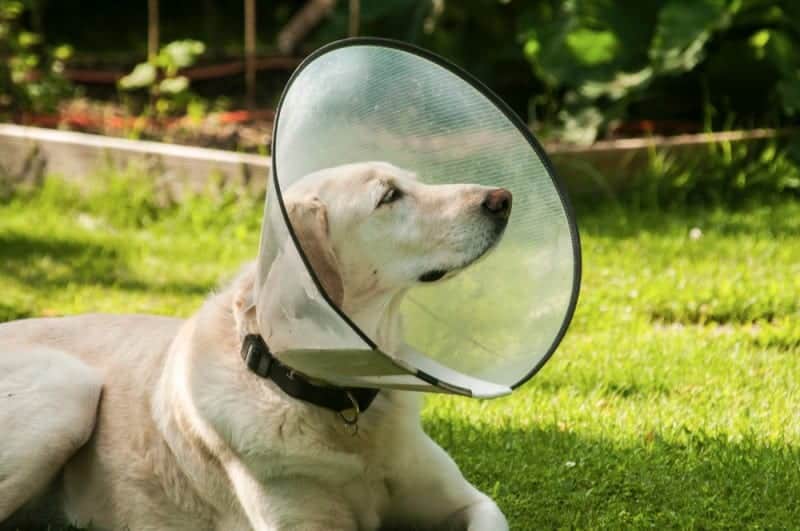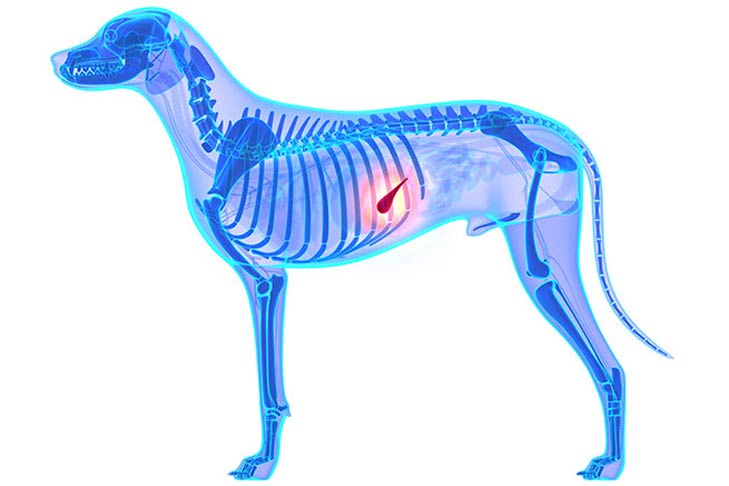To be an owner of a Labrador retriever, you must put your dog’s needs before your own. Labradors require big long term time commitments when it comes to fulfilling the responsibility of taking care of the pup’s well-being. A few responsibilities include feeding your Lab at an appropriate time, making sure it’s getting plenty of exercise, and scheduling a neuter appointment at an appropriate age.
Neutering is a surgical procedure that involves the physical removal of testicles in male dogs, thus, ruling out their ability to reproduce. In this day and age, attitude towards neutering is changing at a rapid pace from one country to another. Given below are a few points which illustrate whether neutering is supposed to be a good thing for all dogs or whether it would do them more harm than good?
When should you neuter your Labrador retriever?
Though the act of neutering Labradors have proved to be very beneficial over the years, you must get the neutering procedure done at an appropriate age as this can pose a serious threat to the health of your Labrador. Quite a few veterinarians believe that it is better to neuter your Labrador when it is just six months old. However, a certain research study proves that neutering a Labrador this early could intensify the likelihood of joint disorders and in some circumstances, may even cause cancer.
American Kennel Club’s Canine Health Foundation recommends that it’s probably for the best that your Labrador retriever is neutered after it hits puberty, that is, when your Labrador retriever is around 9 to 15 months old.
Benefits to neutering your Labrador retriever

Numerous health benefits come with neutering your Labrador retriever. Some of them may include:
- Birth control: Quite a few dog owners believe that it is their duty to neuter their Labrador retriever’s at an appropriate age to preclude the birth of puppies. Though there may be several other methods to ensure that Labs do not reproduce all their life, neutering is considered a popular, permanent means to cease reproduction. Neutering your Lab can deter overpopulation and also bring an end to unsafe breeding practices.
- Reduces health risks: Research has shown that neutering plays an important role in increasing the longevity of a Labrador. The life span of male Labs boosts up to 13.8% and for female Labs, it extends to 26.3%. Gonadectomy is a surgical procedure which not only neuters your Labrador, but also increases your pup’s lifespan. It also helps reduce the risk of Pyometra, a life-threatening uterine infection that is prevalently found in Labs. Neutering can additionally reduce testicular cancer in males and cervical tumors in females.
- For behavioral purposes: More than a few Labrador retriever owners rely on neutering as the perfect solution for behavior improvement. Seeing as male Labrador retrievers start exhibiting unwanted behaviors like mounting, roaming, and aggression towards other dogs or family members after it enters its adulthood phase, neutering is regarded as the best possible tool to minimize these erratic behaviors.
- Reduces sexual behavior: As testosterones fall to low levels after the neutering process, it moderately reduces the Labrador’s desire to be attracted to female dogs and in turn, will also eliminate roaming, masturbating, and mounting.
- Reduces aggressive behavior: Castration proves to be an effective tool in getting rid of certain forms of aggression that occur due to the presence of testosterone. Furthermore, neutering your Labrador also rules out the passing down of aggressive genetic traits.
Risks involved in neutering your Labrador retriever
The effectiveness of retrospective studies have led doctors to believe that there is no clear-cut evidence indicating that neutering your male dogs would help prevent all health issues. A few reasons why neutering may negatively impact your Labrador’s health are:
- Vulnerability to become obese: When your Labrador retriever is neutered, it slowly starts losing its metabolism and subsequently becomes obese. Research has shown that neutered animals require 25% calories at most to maintain a healthy diet. On that account, if an owner wants to get his pet neutered, he must make sure to adjust his dog’s diet beforehand.
- Growth problems: Veterinarians always advise dog owners to neuter their Labrador retrievers after their dogs have attained puberty. The reason for this is that hormones play a very important role in the growth and development of your Labrador. Early neutering of your Labrador can result in the delay of the closure of the growth plate, ultimately leading to a growth spurt in a Labrador at a young age. The dog is then prone to a risk of joint problems later in life.
- Risk of hypothyroidism due to hormonal imbalance: Hypothyroidism is a health condition that is caused due to the imbalance of hormones after the castration procedure. This eventually leads to disruptions in your Labradors metabolism, body temperature, and heartbeat rates.
- Neutering is a surgical operation performed by veterinarians to help de-sex a Labrador. Before performing this procedure, vets primarily use general anesthesia on Labradors to make them unconscious. On that account, experts have proved that at least 20% of the castration procedures conducted have at least one complication due to the use of general anesthesia and this, in turn, affects your Labrador either in the form of an infection or an abscess. Fortunately, most of the complications faced due to general anesthesia are minor and less than 5% are serious. Also, though the death rate among Labradors due to general anesthesia is only less than 1%, that doesn’t necessarily mean it’s completely safe.
Different methods of neutering

Neutering is considered one of the oldest continuously practiced procedures in the present day. There were times when neutering was just a surgical procedure to help de-sex a dog. However, at present, there are other neutering procedures one can employ to make a Lab infertile. They include:
- Surgical castration of male dogs: Male Labrador retrievers traditionally undergo a surgical procedure where veterinarians make a small incision in their scrotum to physically remove male testicles. Surgical castration is an effective birth control tool because dogs tend to recover quickly from the surgery and become infertile in just a few months. It is, however, a permanent procedure and cannot be reversed.
- Chemical castration: Chemical castration is a new and efficient method of neutering your Labrador. In this method, a chemical named Zeuterin is infused in your dog’s testicles. Though this chemical may cause infertility in your Labrador, it is not as effective a method as surgical castration because it does not result in 100% infertility. This procedure is considered a reversible procedure for Labs. For this reason, some dog owners consider chemical castration as a trial run before finalizing for surgical castration.
The effects of neutering a dog
Besides the fact that your Labrador turns infertile, neutering also has certain additional effects to it. Some of it includes:
- Physical appearance: A neutered male Lab will have no testicles. Due to the absence of the dog’s testicles, it is possible to mistake a male for a female. On that account, Lab owners who like to visually see their dogs with their parts intact do not want to get their dogs neutered. To solve this, one can opt for fake testicle implants, i.e. neuticals, for their Lab to keep them looking the same.
- Behavioral changes: Changes in a neutered Labrador’s behavior is not very predictable. However, certain behaviors tend to diminish due to low testosterone levels. Some reductions may include constant piddling, i.e. cocking its leg every five minutes, boisterous behavior, and roaming, to name a few.
Things you should and shouldn’t do for your neutered dog
After a Labrador retriever is neutered, the owner needs to stay by its side and take good care of it. Though most Labs recover quickly on their own, there are certain methods an owner can employ to help enhance the recovery process. Some include:
- Care after arriving home: When you bring your neutered Lab back home from the vet, you tend to notice that your dog appears sadder or more disoriented than usual. The reason for this is because Labradors tend to remain silent for the first 24 hours after castration, i.e., until the effects of the anesthesia wear off. During this period, the owner must set the Labrador in a quiet place, along with a comfortable bed and a pleasant room temperature.
- Food and water: After you bring your neutered Lab home, it is necessary to give him small amounts of water. If you let your Lab drink excess water, it would result in vomiting. It is important to then let your Lab rest for a while before you offer it food. After the 24 hour break, you can offer your Lab normal amounts of food and water.
- Medication: Veterinarians use long-term pain medications to help Labradors during their surgical castration procedure. The effects of the medication last for about 24-36 hours. Therefore, it is normal for vets to prescribe pain medications for your Lab during this time. You must follow all the instructions given by the vet carefully and not use human medication on your Lab to compensate for the drugs in the prescription as this may harm your pet’s health.
- Bathroom habits: If your Labrador doesn’t urinate enough within the first 72 hours after surgery, you must contact your veterinarian immediately. An owner must also make sure of the fact that there isn’t any blood in their Lab’s urine.
- Activity levels: Normally, it takes 24-48 hours after surgery to bring your Lab back to its normal state. Nevertheless, one should postpone their Lab’s activities until at least a week after the surgery. The reason is that too much activity could result in an opening of the surgery site. Consequently, an owner must make sure to restrain his Lab from going to certain places in the house, walk his dog for short periods and not allow his dog to interact or play rough with other animals.
Whether or not I should castrate my dog
Seeing as how castrating a Labrador retriever can render a Lab infertile (although not immediately), neutering should be considered an important decision for the owner to take in respect of his Lab. Neutering isn’t a decision a Lab owner should take lightly because sometimes, it is not considered a perfect solution that is right for every Lab. In general, Lab owners tend to neuter their dog on account of two common reasons- good health and due to undesirable behavior.
If a Lab owner does not have any issues with his male Labrador’s behavior (if his dog doesn’t exhibit behavioral problems like cocking his leg on everything, showing aggressive behavior towards other male dogs, or sexual habits like mounting or roaming) then there is no reason as to why he should neuter his dog. But if a few dog owners don’t want their Lab to contribute to a vast number of unwanted puppies (avoid overpopulation of Labs) or if they want to protect their Lab from different kinds of medical conditions, then they can go right ahead and get their dog neutered.
To better help their decision-making process, one can also consider the various pros and cons associated with neutering male Labs. Despite that, if one still has second thoughts about it, he can always consider the option of talking to his Lab’s veterinarian to ask them for the ideal solution.
Neutering in different countries
Quite a few countries mandate castration of Labrador retrievers at a very young age. In such countries, Lab owners are considered irresponsible when they don’t neuter their pets on time. For instance, Los Angeles deems it necessary to sterilize a Labrador before 4 months of age. Nations like Australia and the USA routinely practice neutering.
Besides, these nations have also been arranging a widespread neuter campaign for many decades now. Apart from this, some regions consider neutering to be an offensive procedure. For example, In Norway, it is considered unacceptable to neuter your dog without valid medical reasons (birth control is not considered a valid reason). In nations like the United Kingdom and India, neutering is not practiced everywhere.
Though many Labradors are neutered, there are also quite a few dogs that are not neutered.
Conclusion
Neutering is considered one of the most common surgical procedures for pets around the world. Labrador owners opt for neutering as a measure to avoid unwanted pregnancies, reduce notable risks of diseases and cancers, and control behavioral issues like humping and roaming. However, apart from the benefits, a Lab owner must consider the side effects too. Though the idea of neutering proves beneficial for Labs, doing it at an early age can cause growth problems.
Furthermore, neutering also exposes the dog to a higher risk of obesity and hypothyroidism. Hence, the procedure of neutering is neither entirely beneficial nor entirely pointless. Its motive and necessity simply vary from individual to individual.
Therefore, it’s considered advisable for an owner to first discuss his Lab’s alternatives with a trusted veterinarian. In this article, we discuss the neutering procedure of a Labrador retriever, the age one should consider while neutering a Lab, the benefits of neutering a Lab, risks involved in neutering, its effects, and many more.
References
- https://journals.plos.org/plosone/article?id=10.1371/journal.pone.0102241
- https://www.tandfonline.com/doi/abs/10.2752/089279305785594135
Table of Contents



